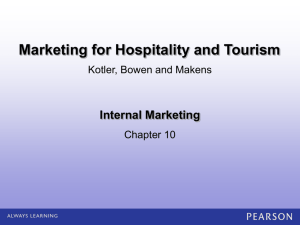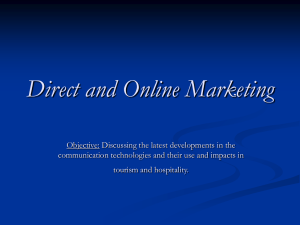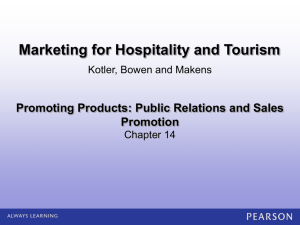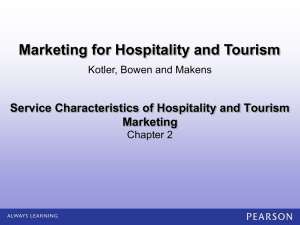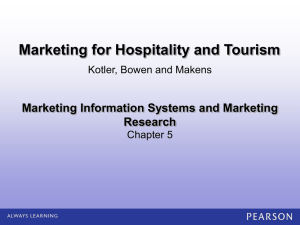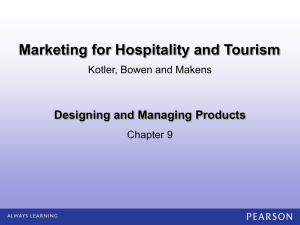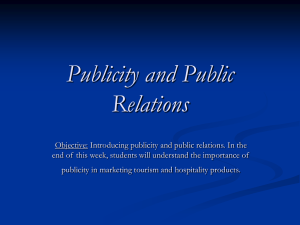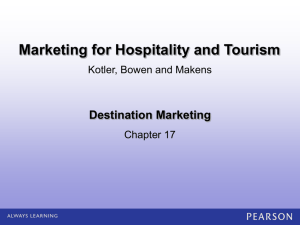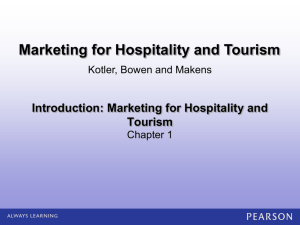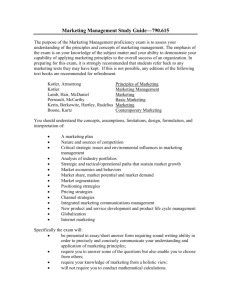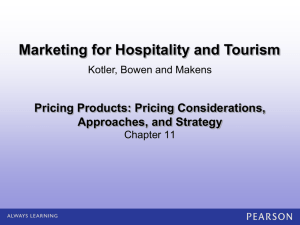Chapter Title
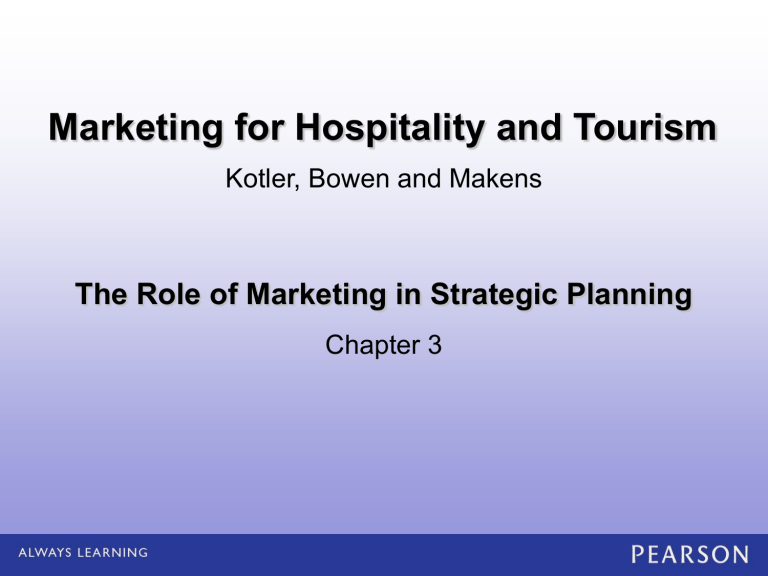
Marketing for Hospitality and Tourism
Kotler, Bowen and Makens
The Role of Marketing in Strategic Planning
Chapter 3
Learning Objectives
1. Explain company-wide strategic planning .
2. Understand the concepts of stakeholders , processes , resources , and organization as they relate to a highperforming business.
3. Explain the four planning activities of corporate strategic planning .
4. Understand the processes involved in defining a company’s mission and setting goals and objectives .
5. Discuss how to design business portfolios and growth strategies .
6. Explain the steps involved in the business strategy planning process .
Marketing for Hospitality and Tourism, 6e
Kotler, Bowen and Makens
© 2014 by Pearson Higher Education, Inc
Upper Saddle River, New Jersey 07458 • All Rights Reserved
Characteristics of a High-
Performance Business
Stakeholders Processes
Resources Organization
Marketing for Hospitality and Tourism, 6e
Kotler, Bowen and Makens
© 2014 by Pearson Higher Education, Inc
Upper Saddle River, New Jersey 07458 • All Rights Reserved
Defining the Corporate Mission
• A hospitality organization exists to accomplish something
• According to Peter Drucker, ask:
– What is our business?
– Who is the customer?
– What do customers value?
– What should our business be?
Marketing for Hospitality and Tourism, 6e
Kotler, Bowen and Makens
© 2014 by Pearson Higher Education, Inc
Upper Saddle River, New Jersey 07458 • All Rights Reserved
Developing Growth Strategies
Market
Concentration
Strategy
Market
Development
Strategy
Product
Development
Diversification
Growth
Marketing for Hospitality and Tourism, 6e
Kotler, Bowen and Makens
Integrative
Growth
© 2014 by Pearson Higher Education, Inc
Upper Saddle River, New Jersey 07458 • All Rights Reserved
Diversification Growth
Concentric
Diversification
Conglomerate
Diversification
Horizontal
Diversification
Marketing for Hospitality and Tourism, 6e
Kotler, Bowen and Makens
© 2014 by Pearson Higher Education, Inc
Upper Saddle River, New Jersey 07458 • All Rights Reserved
Integrative Growth
Backward
Horizontal Forward
Marketing for Hospitality and Tourism, 6e
Kotler, Bowen and Makens
© 2014 by Pearson Higher Education, Inc
Upper Saddle River, New Jersey 07458 • All Rights Reserved
Customer-Driven Marketing Strategy
Market
Segmentation
Market
Targeting
Market
Differentiation
Market
Positioning
Marketing for Hospitality and Tourism, 6e
Kotler, Bowen and Makens
© 2014 by Pearson Higher Education, Inc
Upper Saddle River, New Jersey 07458 • All Rights Reserved
Developing an Integrated Marketing Mix
4 Ps
Product
Price
Place
Promotion
4 Cs
Customer Solution
Customer Cost
Convenience
Communication
Marketing for Hospitality and Tourism, 6e
Kotler, Bowen and Makens
© 2014 by Pearson Higher Education, Inc
Upper Saddle River, New Jersey 07458 • All Rights Reserved
Managing the Marketing Process
Analysis Planning
Implementation
Control
Marketing for Hospitality and Tourism, 6e
Kotler, Bowen and Makens
© 2014 by Pearson Higher Education, Inc
Upper Saddle River, New Jersey 07458 • All Rights Reserved
SWOT Analysis
Internal Environmental Analysis
Strengths Weaknesses
External Environmental Analysis
Opportunities Threats
Marketing for Hospitality and Tourism, 6e
Kotler, Bowen and Makens
© 2014 by Pearson Higher Education, Inc
Upper Saddle River, New Jersey 07458 • All Rights Reserved
Goal Formulation Strategies
Overall Cost
Leadership
Differentiation Focus
Marketing for Hospitality and Tourism, 6e
Kotler, Bowen and Makens
© 2014 by Pearson Higher Education, Inc
Upper Saddle River, New Jersey 07458 • All Rights Reserved
Key Terms
Ansoff product –market expansion grid A matrix developed by cell, plotting new products and existing products with new products and existing products. The grid provides strategic insights into growth opportunities.
Backward integration A growth strategy by which companies acquire businesses supplying them with products or services (e.g., a restaurant chain purchasing a bakery).
Concentric diversification strategy definition to look like this.
Definition to look like this.
Marketing for Hospitality and Tourism, 6e
Kotler, Bowen and Makens
Conglomerate diversification strategy A product growth strategy in which a company seeks new businesses that have no relationship to the company’s current product line or markets.
Corporate mission statement A guide to provide all the publics of a company with a shared sense of purpose, direction, and opportunity, allowing all to work independently, yet collectively, toward the organization’s goals.
Forward integration A growth strategy by which companies acquire businesses that are closer to the ultimate consumer, such as a hotel acquiring a chain of travel agents.
© 2014 by Pearson Higher Education, Inc
Upper Saddle River, New Jersey 07458 • All Rights Reserved
Key Terms (cont.)
Horizontal diversification strategy A product growth strategy whereby a company looks for new products that could appeal to current customers that are technologically unrelated to its current line.
Horizontal integration A growth strategy by which companies acquire competitors.
Macroenvironmental forces
Demographic, economic, technological, political, legal, social, and cultural factors.
Market development strategy
Finding and developing new markets for your current products.
Marketing for Hospitality and Tourism, 6e
Kotler, Bowen and Makens
Market segmentation The process of dividing a market into distinct groups of buyers who have different needs, characteristics, or behavior who might require separate products or marketing programs.
Marketing opportunity An area of need in which a company can perform profitably.
Marketing strategy The marketing logic by which the company hopes to create this customer value and achieve these profitable relationships.
Microenvironmental forces
Customers, competitors, distribution channels, and suppliers
© 2014 by Pearson Higher Education, Inc
Upper Saddle River, New Jersey 07458 • All Rights Reserved
Key Terms (cont.)
Product development Offering modified or new products to current markets.
Strategic alliances Relationships between independent parties that agree to cooperate but still retain separate identities.
Strategic business units (SBUs)
A single business or collection of related businesses that can be planned separately from the rest of the company.
Strategic planning The process of developing and maintaining a strategic fit between the organization’s goals and capabilities and its changing marketing opportunities.
SWOT analysis Evaluates the company’s overall strengths (S), weaknesses (W), opportunities (O), and threats (T)
Marketing for Hospitality and Tourism, 6e
Kotler, Bowen and Makens
© 2014 by Pearson Higher Education, Inc
Upper Saddle River, New Jersey 07458 • All Rights Reserved
